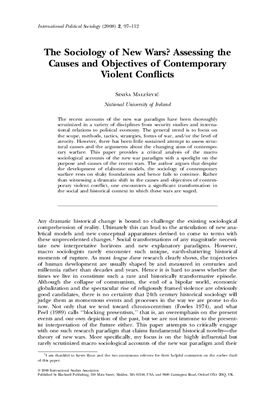The recent accounts of the new war paradigm have been
thoroughly
scrutinized in a variety of disciplines from security studies and inteational
relations to political economy. The general trend is to focus on
the scope, methods, tactics, strategies, forms of war, and ? or the level of
atrocity. However, there has been little sustained attempt to assess structural
causes and the arguments about the changing aims of contemporary
warfare. This paper provides a critical analysis of the macro
sociological accounts of the new war paradigm with a spotlight on the
purpose and causes of the recent wars. The author argues that despite
the development of elaborate models, the sociology of contemporary
warfare rests on shaky foundations and hence fails to convince. Rather
than witnessing a dramatic shift in the causes and objectives of contemporary
violent conflict, one encounters a significant transformation in
the social and historical context in which these wars are waged.
scrutinized in a variety of disciplines from security studies and inteational
relations to political economy. The general trend is to focus on
the scope, methods, tactics, strategies, forms of war, and ? or the level of
atrocity. However, there has been little sustained attempt to assess structural
causes and the arguments about the changing aims of contemporary
warfare. This paper provides a critical analysis of the macro
sociological accounts of the new war paradigm with a spotlight on the
purpose and causes of the recent wars. The author argues that despite
the development of elaborate models, the sociology of contemporary
warfare rests on shaky foundations and hence fails to convince. Rather
than witnessing a dramatic shift in the causes and objectives of contemporary
violent conflict, one encounters a significant transformation in
the social and historical context in which these wars are waged.

